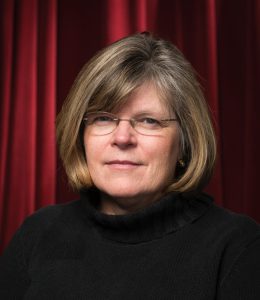 Shortly after I began work at NEHGS about ten years ago, we went into all-hands-on-deck mode. The occasion was the National Genealogical Society’s annual conference, which was in Boston that year and bringing many visitors to the building. A newbie, I was assigned the non-genealogical task of welcoming people at the door. The first person arrived, pulling a wheelie bag behind her. “Hello!” I said. “May I store your bag?” Everyone froze. A hushed silence fell. Finally someone clued me in: “Penny. That’s her research!” Oh. Continue reading The genealogist’s friend
Shortly after I began work at NEHGS about ten years ago, we went into all-hands-on-deck mode. The occasion was the National Genealogical Society’s annual conference, which was in Boston that year and bringing many visitors to the building. A newbie, I was assigned the non-genealogical task of welcoming people at the door. The first person arrived, pulling a wheelie bag behind her. “Hello!” I said. “May I store your bag?” Everyone froze. A hushed silence fell. Finally someone clued me in: “Penny. That’s her research!” Oh. Continue reading The genealogist’s friend
Tag Archives: Family papers
A hint of personality
 Behind the scenes, the NEHGS web team is hard at work preparing the searchable version of our Roman Catholic Archdiocese records. As part of that process, our volunteers create spreadsheets that associate information with a specific image file. I proofread these spreadsheets as part of our quality control process.
Behind the scenes, the NEHGS web team is hard at work preparing the searchable version of our Roman Catholic Archdiocese records. As part of that process, our volunteers create spreadsheets that associate information with a specific image file. I proofread these spreadsheets as part of our quality control process.
I’ve recently encountered some confirmation records and was intrigued by their potential value to genealogists. Most confirmation records do not contain parents’ names – they usually just consist of a last name, first name, date, and maybe a sponsor. Continue reading A hint of personality
Deadheading

My grandmother Katheryn Ogle Record (1914–1993) was a dead head. No, surely not that kind of dead head, but one who collected those lifetime addenda we all hope someone will afford each of us someday. We call them obituaries, and at a very early age my grandmother began collecting them. In some ways my grandmother was the consummate family historian. While I never saw her record births or deaths in a family Bible, or transcribe items from a census, she did keep records – and actually very good ones. Continue reading Deadheading
The language of colonial relationships
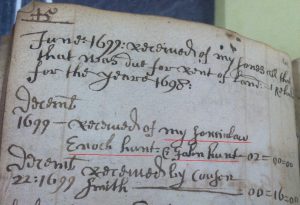 Typically, when researching family history, finding documents in which individuals state their relationship to each other is a source of excitement. These kinds of discoveries provide researchers with crucial information for genealogical research. However, during my time as a researcher here at NEHGS, I have come across some examples of direct statements of relationships that are not always what they appear to be. This insight specifically relates to colonial era documents, where relationships might be described differently than they are today. Continue reading The language of colonial relationships
Typically, when researching family history, finding documents in which individuals state their relationship to each other is a source of excitement. These kinds of discoveries provide researchers with crucial information for genealogical research. However, during my time as a researcher here at NEHGS, I have come across some examples of direct statements of relationships that are not always what they appear to be. This insight specifically relates to colonial era documents, where relationships might be described differently than they are today. Continue reading The language of colonial relationships
A scrapbook love letter
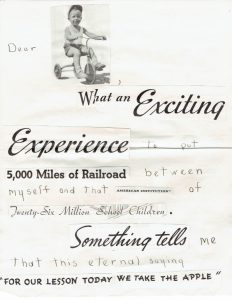
I grew up in a normal home with two parents, one older brother, various dogs, cats (house and barn varieties), and a one-time parakeet. Like most people with that background, I thought I knew my parents and their individual backgrounds well, especially because my mother was careful to instill in me an appreciation of both lines of the family history.
In the early-mid 1930s, my mother was teaching and boarding with the principal of her school where My Father The Milkman delivered the semi-weekly bottles. It was a bottle of milk that began my parents’ relationship and a 1938 marriage lasting for more than 57 years, until my father’s death in 1995. Continue reading A scrapbook love letter
‘The salvation of the country’

61 Bowdoin Street, Boston, Wednesday, 9 November 1864: The great election-day passed off without disorder or disturbance – and, Thank God, Lincoln is re-elected by splendid majorities. Every New Eng. state, Penna. & New York state have gone for him. New Y. city went McClellan[2] by 30,000 majority – but that was expected; & he has New Jersey & Kentucky – all the others are Lincoln.
Kansas did not even have an opposition ticket, so heartily Republican was the whole state. The long anxiety, suspense, & dread are over – a good God has overruled the madness of home traitors for their own ruin, and the salvation of the country; that accursed Chicago platform, the offspring of foul treason, cowardice, and political corruption, happily trampled McClellan’s hopes to nothingness. He might have had some chance but for that. Continue reading ‘The salvation of the country’
Book marks
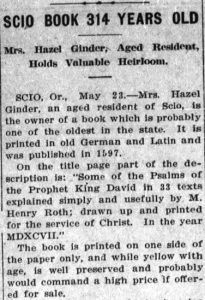
With the addition of so many newspapers to online databases, it’s been illuminating to page back through time to see so much of our ancestors’ everyday lives. For me, one of the more curious people encountered ‘in the news’ has been my maternal great-great-grandfather Jacob Ginder (1837–1901). Jacob’s roots are unusual in my standard array of westward migrating New Englanders. Jacob’s origins are from mid-Atlantic Quaker stock, the kind you can follow backwards from Iowa to Virginia in the 1700s.
While it isn’t in the newspapers, I know that Jacob Ginder wasn’t one to sit still. Continue reading Book marks
A family reunion
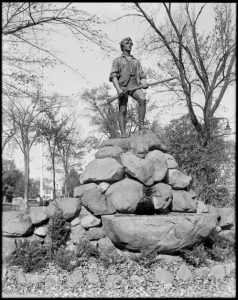
Patriots’ Day, a holiday unique to the State of Massachusetts, commemorates the famous skirmishes between local colonial militia and the British army in Lexington and Concord, Massachusetts, on 19 April 1775. In Lexington, the day is typically celebrated with an early morning reenactment of the skirmish on the town’s green. As an avid watcher of the reenactment, my favorite part of the event comes just prior to the skirmish. Before the fighting ensues, members of the Lexington minutemen—each representing a particular individual who was present on the green that morning—gather on the common for a roll call and commence calling their names in succession. As the roll is taken, one cannot help but notice the frequency at which similar surnames are repeated. Hearing this serves as a reminder that the men who stood on the green that April morning were not only committed to defending their town, their property, and their rights, but they were also related. Continue reading A family reunion
Poppa’s wallet
 My grandfather (Walter Robert “Bob” Heisinger, a.k.a. Poppa) was notorious for carrying around a gigantic wallet bursting at the seams with photographs, business cards, and other little mementos he picked up over the years. He would often pull bits and pieces out at social gatherings as props to his stories and jokes. I remember harassing him as a teenager that the thickness of the wallet was contributing to his hip problems and I made a box for him to store some of its contents, though I am sure the box remained empty for the rest of his life. Continue reading Poppa’s wallet
My grandfather (Walter Robert “Bob” Heisinger, a.k.a. Poppa) was notorious for carrying around a gigantic wallet bursting at the seams with photographs, business cards, and other little mementos he picked up over the years. He would often pull bits and pieces out at social gatherings as props to his stories and jokes. I remember harassing him as a teenager that the thickness of the wallet was contributing to his hip problems and I made a box for him to store some of its contents, though I am sure the box remained empty for the rest of his life. Continue reading Poppa’s wallet
One more!
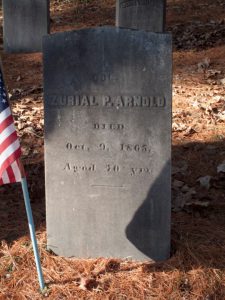
An example of how a final spouse might be overlooked occurred when I was researching a “double Lippitt” spouse, Zurial Potter Arnold (1795–1865) of Eastford, Connecticut.[1] Zurial was married to two daughters of Moses and Anstress (Holden) Lippitt of Killingly, Connecticut. He first married Ann Lippitt in 1816; she died in 1823. He then married Ann’s sister Hannah in 1824. I found a reference to Zurial’s 1865 death on findagrave, which showed he was buried near a total of four wives, as also shown below in the Charles R. Hale Collection of Connecticut Cemetery Inscriptions. Continue reading One more!